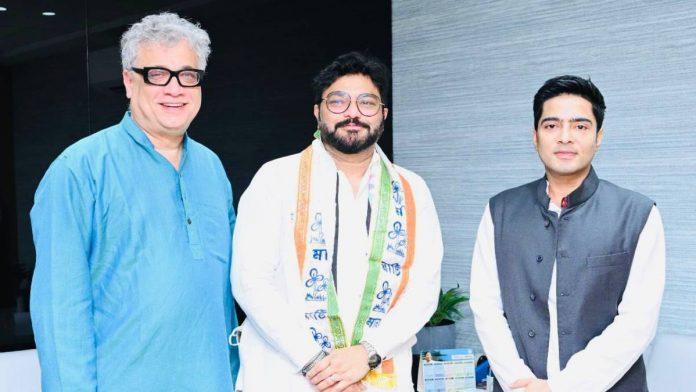Why Politicians Get Away with Swapping Parties

The metamorphosis of singer-turned-politician Babul Supriyo from rabid Hindutva crusader into neat secularist establishes that Indian politics has become a circus with opportunism as the ringleader and the people its hapless subjects.
As a maiden Member of Parliament of the Bharatiya Janata Party (BJP) in Bengal, Supriyo left no stone unturned to stoke communalism in the city of Asansol. When the flames of communal rioting engulfed the city, he and his accolades were on the barricades, adding proverbial fuel to the fires. On one occasion, he threatened to skin the members of the ruling Trinamool Congress (TMC). And now we find him donning TMC skin!
What explains this opportunism? Can we infer India has entered a post-ideological phase of politics? Or is there such a clamour to derail the RSS-BJP-led Hindutva juggernaut because some of its more conscientious soldiers can see the doom of India (as we know it) and are thrusting their swords into the bowels of their earlier masters? Both conjectures get disproved by the history of Indian politics since 2014. Other deeper miasmas plague Indian politics, but before we unpack them, let us challenge the suppositions.
First, the rise of the RSS-BJP since 2014 also means the ascendancy of ideology in Indian politics. Notwithstanding its history coeval with European fascism and ability to lead secular-democratic India to the gallows, Hindutva is an ideology. It has allowed the RSS-BJP to grow in regions where its political existence was a matter of consternation for its erstwhile leadership. Bengal and the North-East being such places. At the same time, in these regions, we see a quick reneging on the ideology of Hindutva once it becomes apparent that the key to power is no more of the saffron colour.
From Mukul Roy, former vice-president of the Bengal BJP, to the innumerable Hindutva cadres at the grass-roots, they have followed this trend almost religiously. The question arises, how is it possible to bin ideology almost overnight? The answer lies in the rent-seeking nature of Indian politics. Before 1991, opportunities to cream money off through public offices were limited to well-placed politicians and fixers. Local and district leaders hardly had lucrative entrepôts of loot. But after the neoliberal reforms and massive urban development, even diminutive public offices became units of quick money.
From construction to mining, syndicates and networks oiled by the local administration (municipalities, corporations and district bodies) and regulated by the police have become the order of the day. These play a crucial role in supporting and sustaining the unemployed and unskilled youth of cities and towns. A huge network of patronage and rent-seeking has developed, and the ruling political party is its anvil. These elements are tied to no ideology. Desertions occur, as in Bengal of late, to the opposition party only when it appears to offer better prospects for loot in an already overcrowded market.
In Asansol, a sleepy city until the 1990s, urban expansion rose to unprecedented levels by the mid-2000s. The rise of the TMC to power in 2010 marked the division of the city’s resources from sand to coal and real estate into the hands of the party leadership. A vast network of syndicates developed owing allegiance to the ruling party and its internal cliques. Jitendra Tiwari, the former mayor of no less than 150 wards of the Asansol Municipal Corporation (AMC), who joined the BJP before elections, is in the lurch after his defeat. His switch to the BJP mainly got attributed to the other ‘older’ and ‘bigger’ dogs on the block into whose share he was inadvertently eating. And the BJP could promise him and his acolytes little else than greener and ‘lonelier’ pastures. The bid failed, forcing Tiwari and his family to flee the city for apparently safer Kolkata.
This episode represents the new ideological politics: rent-seeking and corruption. The turn to Hindutva or the flip towards constitutional secularism is just a means towards achieving these ends. It is the bitter reality of Indian politics.
As things stand, there seems to be no reprieve in the short run. The entire political opposition appears ‘divided’, as in Uttar Pradesh, where regional players cannot let go of their differences to unite against the BJP. The portend for the 2024 General Election is ominous. Of the many things the Opposition can do, one is to offer a sound political alternative. One way to do this is to come together on a set of constructive programs. For example, universal health care is bound to gather cross-class acceptance as against the corporate-Hindutva model. After suffering heavy losses due to massively underfunded public healthcare, with a catchy slogan such as ‘khansi se lekey cancer ka ilaaj, sarkar ki hogi zimmedari’, the Opposition could capture the imagination of even the virulently pro-Hindutva middle classes.
Criticism of the government on issues that impact the everyday lives of people have immense potential too. The speech delivered by Manoj Jha, the Rashtriya Janata Dal representative in the Rajya Sabha, went wildly viral though he merely referred to the need to link the right to health to the right to life. He gave no solid blueprint for doing it. Imagine what would happen if the entire Opposition comes together with this plank. It would mark a necessary break from the opportunism that plagues Indian politics. And it would heal the wounds of those who suffered the deaths of loved ones or were forced to foot exorbitant medical bills during the deadly waves of COVID-19.
The author is a research scholar with the Department of World History, University of Cambridge. The views are personal.
Get the latest reports & analysis with people's perspective on Protests, movements & deep analytical videos, discussions of the current affairs in your Telegram app. Subscribe to NewsClick's Telegram channel & get Real-Time updates on stories, as they get published on our website.
























